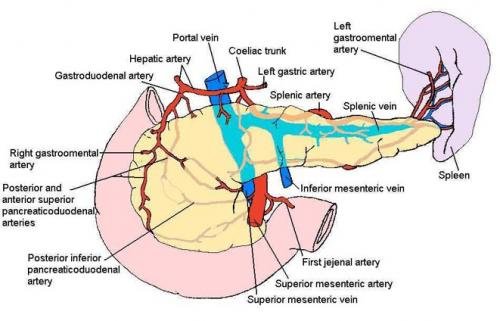Pancreas anatomy

Pancreas
- Mixed endocrine / exocrine gland
- Secretes 1-1.5l pancreatic juice daily
Function of the pancreas
- Endocrine
- Alpha cells: Glucagon
- Beta Cells: Insulin
- Carbs: - Increase glucose uptake, stimulates glycogensis
- Proteins: Enhances AA into peripheral tissues, stimulates protein synthesis
- Fats: Stimulates lipid uptake
- Potassium: into cells
- [Gamma cells: pancreatic polypeptide - reduces appetite]
- Delta Cells: Somatostatin
- Exocrine
- 1 - 1.5l pancreatic juice / day
- Aqueous component - water, bicarbonate
- Enzymatic component - digestive enzymes
- (1) Proteases (secreted as inactive zymogen form) - trypsinogen, chymotrypsinogen, procarboxypeptidase, proelastase
- (2) Lipolytic - Lipase, Phospholipase A2
- (3) Starch digestion - Amylase
Glucose metabolism
- Sources
- Diet
- Glycogenolysis
- Gluconeogenesis
- Lactate, glycerol, Amino acids
- Blood sugar control
- Increase BM: Catecholamines, Glucocorticoids, Somatotrophin
- Decrease BM: Insulin
Ketosis
- Starvation
- Diabetes - (omission of insulin, infection, drug induced)
- Improper utilisation of TCA components
- Increased lipolysis and increased FFA production (readily transportable fatty acids that can be utilised by organs such as heart and brain)
- Ketone production - acetone, acetoacetate, B-hydroxybutyrate